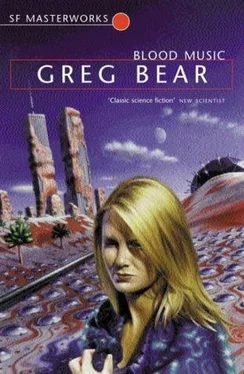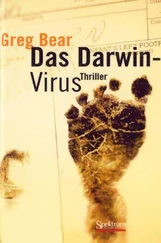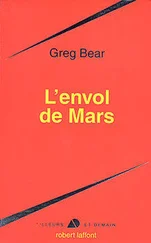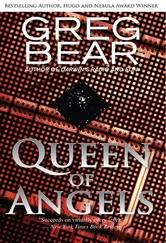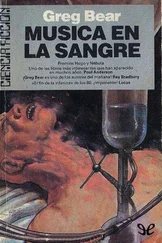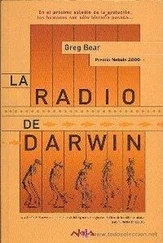The Volvo hummed over the endless stretch of Highway 5 through fields given over to cotton, then through green nut groves. Vergil cut across 580 along the outskirts of Tracy, his mind almost blank, the driving a panacea against his worries. Forests of pylon-mounted propellers turned in harmony on both sides of the highway, each great swinging arm two thirds as wide as a football field.
He had never felt better in his life, and he was worried. He had not sneezed for two weeks, in the middle of a champion allergy season. The last time he had seen Candice, to tell her he was going to Livermore to visit his mother, she had commented on his skin color, which had changed from pallid to a healthy peach-pink, and his freedom from sniffles.
“You’re looking better each time I see you, Vergil,” she had said, smiling and kissing him. “Come back soon. I’ll miss you. And maybe we’ll find more spice.”
Looking better, feeling better—and no excuse for it. He wasn’t sentimental enough to believe that love cured all, even calling what he felt for Candice love. Was it?
Something else.
He didn’t like thinking about it, so he drove. After ten hours, he felt vaguely disappointed as he turned onto South Vasco Road and motored south. He hung a right on East Avenue and drove into downtown Livermore, a small California burg with old stone and brick buildings, old wooden farmhouses now surrounded by suburbs, shopping centers not unlike those in every other town in California…and just outside of town, the Lawrence Livermore National Laboratory, where, among many other researches, nuclear weapons were designed.
He stopped at Guinevere’s Pizza Parlor and forced himself to order a medium garbage pizza and a salad and Coke. As he sat down to wait in the pseudo-medieval dining area, he wondered idly whether the Livermore Labs had any facilities he could use. Who was the more Strangelovian—the weapons folks, or good ol’ Vergil I. Ulam?
The pizza arrived and he looked down on the cheese and condiments and greasy sausage. “You used to like this stuff,” he said under his breath. He picked at the pizza and finished the salad. That seemed to be enough. Leaving most of his meal on the table, he wiped his mouth, smiled at the young girl behind the cash register, and returned to his car.
Vergil did not look forward to visits with his mother. He needed them, in some uncertain and irritating way, but he did not enjoy them.
April Ulam lived in a well-maintained century-old two-story house just off First Street. The house was painted forest green and had a Mansard roof. Two little gardens fenced in with wrought iron flanked the steep front steps—one garden for flowers and herbs, the other for vegetables. The porch was screened-in, with a wood-frame screen door mounted on squeaking hinges and reined in by a complaining steel spring. Entrance to the house proper was through a heavy dark oak door with a beveled-glass window and lion-faced knocker.
None of these commodities were unexpected when attached to an old house in a small California town. But then his mother appeared, svelte and dressed in flowing lavender silks and high-heeled gold shoes, her raven black hair barely touched with at the temples, coming through the oak door and the screen door and stepping into the sunshine. She greeted Vergil with a reserved hug and led him through the parlor, thin cool fingers lightly gripping his hand.
In the living room, she sat on a gray velvet chaise lounge, her gown flowing lightly over the sides. The living room suited the house, being furnished with items an elderly woman ( not his mother) might have gathered over a long and moderately interesting life. Besides the lounge there was a blue flower-print overstuffed couch, a brass round table with Arabic proverbs stamped in concentric circles around abstract geometries, Tiffany-style lamps in three corners and in the fourth, a decayed Chinese Kwan-Yin statue carved from a seven-foot teak log. His father—simply “Frank” in all conversations—had brought the statue back from Taiwan after a merchant marine tour; it had scared three-year-old Vergil half to death.
Frank had abandoned both of them in Texas when Vergil was ten. They had then moved to California. His mother had not remarried, saying that would cut down on her options. Vergil was not even certain his mother and father had divorced. He remembered his father as dark, sharp-faced, sharp-voiced, not tolerant and not intelligent, with a thundering laugh brought out for display at moments of perverse anxiety. He could not imagine even now his mother and father going to bed together, much less living together eleven years. He had not missed Frank except in a theoretical way—missing a father, the imagined state of having a rather who could talk to him, help him with homework, be a touch wiser when he was having trouble with being a child. He had always missed having that sort of father.
“So you’re not working,” April said, surveying her son with what passed for mild concern.
Vergil had not told his mother about his dismissal and didn’t even question how she knew. She had been much sharper than her husband and still could match wits with her son, usually overmatching in practical or worldly matters.
He nodded. “Five weeks now.”
“Any prospects?”
“Not even looking.”
“You were let go with prejudice,” she said.
“Almost with extreme prejudice.”
She smiled; now the verbal fencing could begin. Her son was very clever, very amusing, whatever his other faults. She was not sorry he had no job; that was simply the state of affairs, and he would either sink, or swim. In the past, despite his difficulties, her son had usually stayed on the surface, with much splashing and poor form, but still, on the surface.
He hadn’t asked for money from her since leaving home ten years ago.
“So you come to see what your old mother’s up to.”
“What’s my old mother up to?”
“Her neck, as usual,” she said “Six suitors in the past month. It’s a pain being old and not looking it, Verge.”
Vergil chuckled and shook his head, as he knew she expected. “Any prospects?”
She scoffed. “Never again. No man could replace Frank, thank God.”
“They fired me because I was doing experiments on my own,” he said. She nodded and asked if he wanted tea or wine or a beer. “A beer,” he said.
She indicated the kitchen. “Fridge is unlocked.”
He picked out a Dos Equis and wiped the condensation on his sleeve as he returned to the living room. He sat in a broad-backed armchair and took a long swallow.
“They didn’t appreciate your brilliance?”
He shook his head. “Nobody understands me, Mother.”
She stared off over his shoulder and sighed. “I never did. Do you expect to be employed again soon?”
“You already asked that.”
“I thought maybe rephrasing would bring a better answer.”
“Answer’s the same if you ask in Swahili. I’m sick of working for somebody else.”
“My unhappy misfit son.”
“Mother,” Vergil said, faintly irritated.
“What were you doing?”
He gave her a brief outline, of which she understood little but the most salient points. “You were setting up a deal behind their backs, then.”
He nodded. “If I could have had a month more, and if Bernard had seen it everything would have been just sweet.” He was seldom evasive with his mother. She was virtually unshockable; tough to keep up with, and even tougher to fool.
“And you wouldn’t be here now, visiting your old, feeble mater.”
“Probably not,” Vergil said, shrugging. “Also, there’s a girl. I mean, a woman.”
“If she lets you call her a girl, she isn’t a woman.”
Читать дальше
